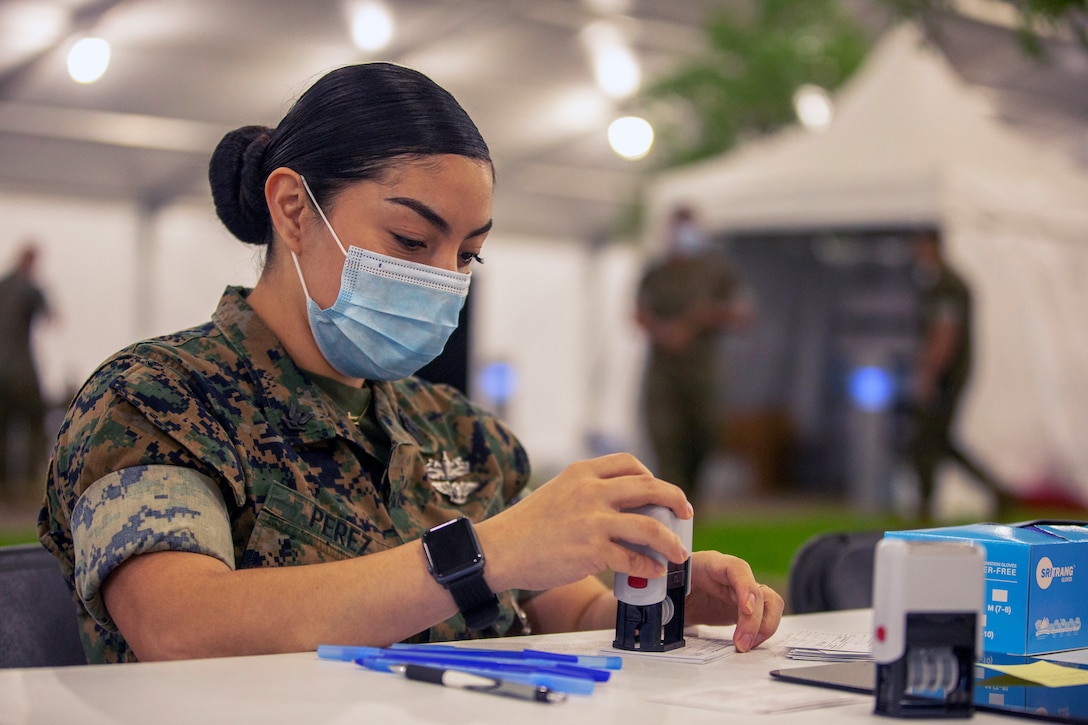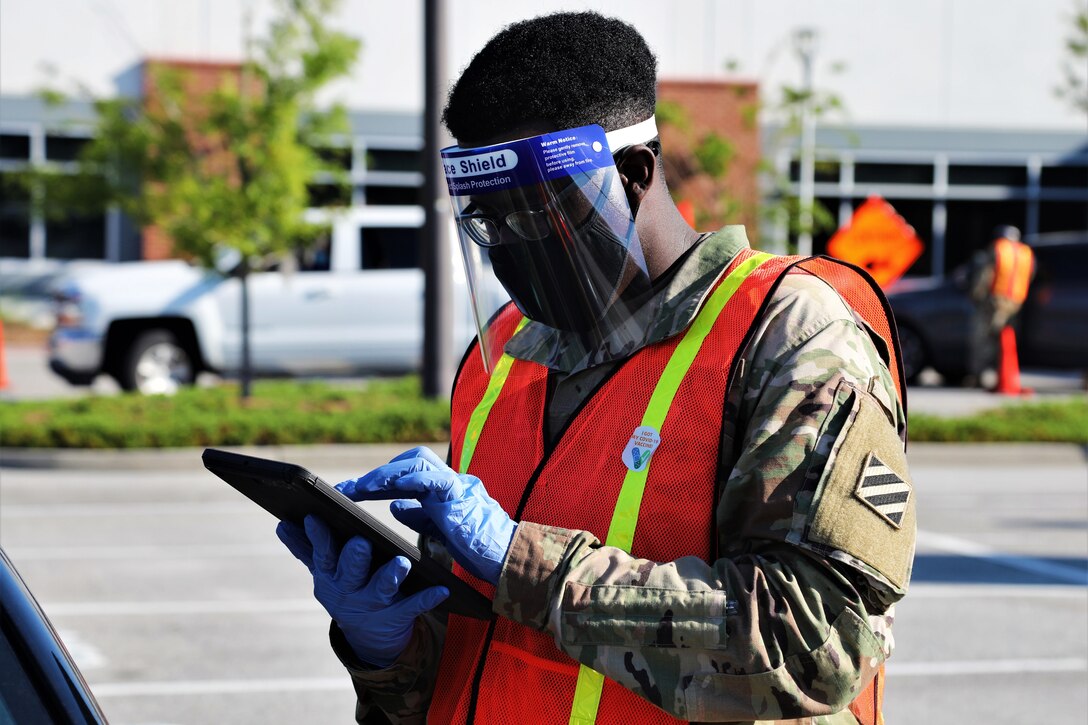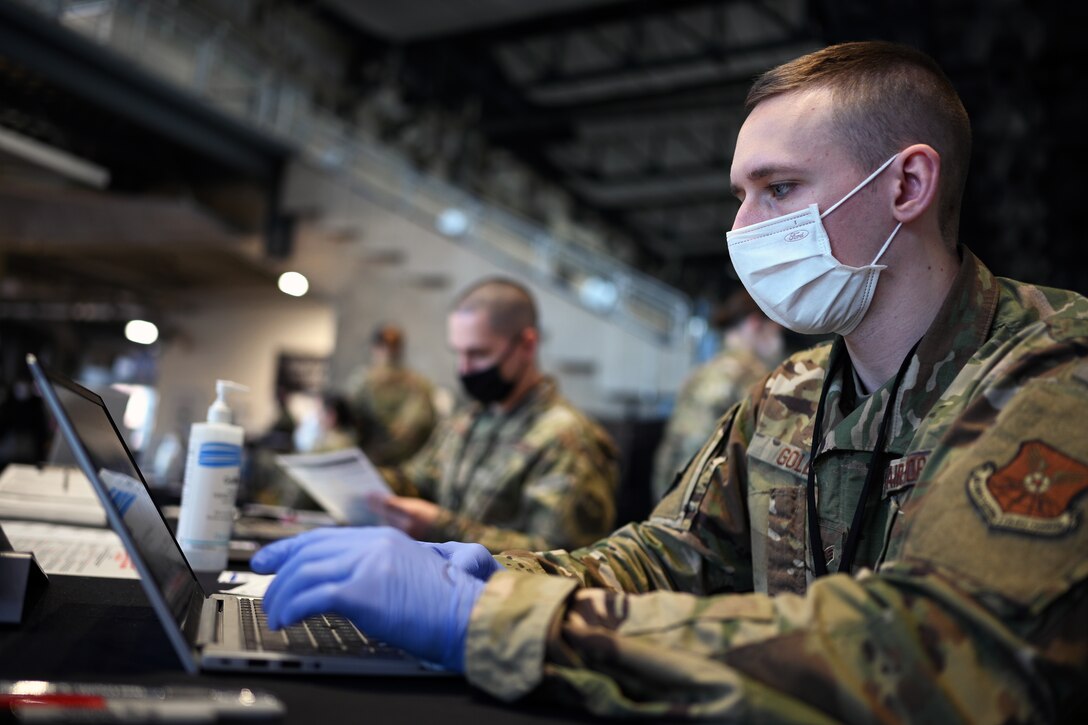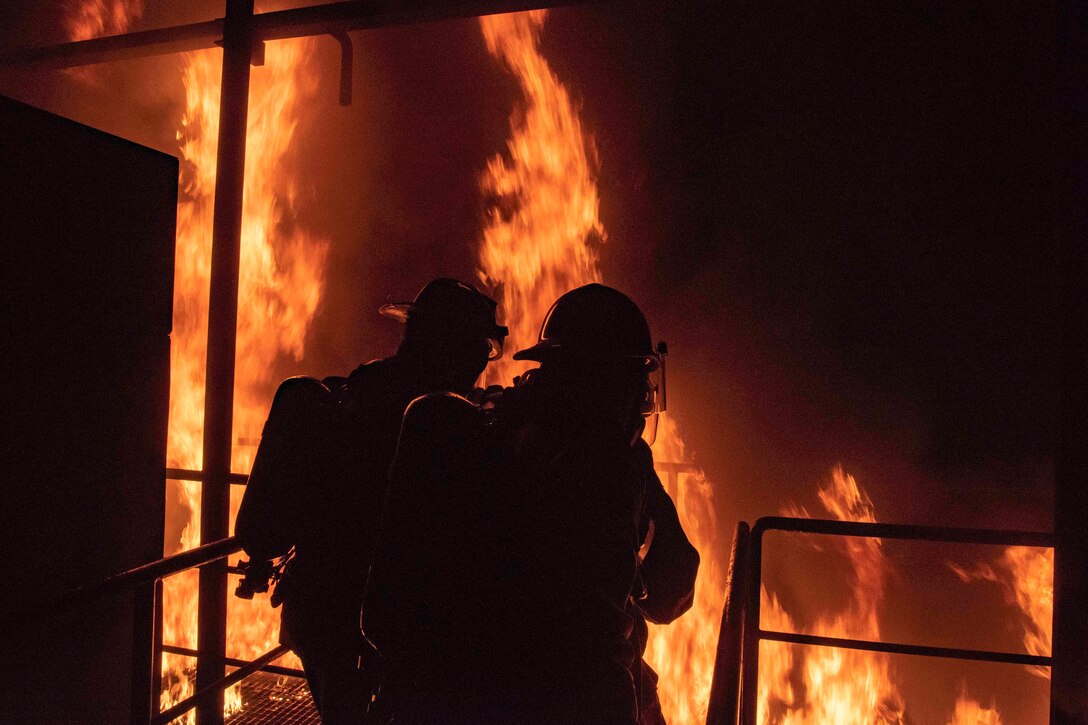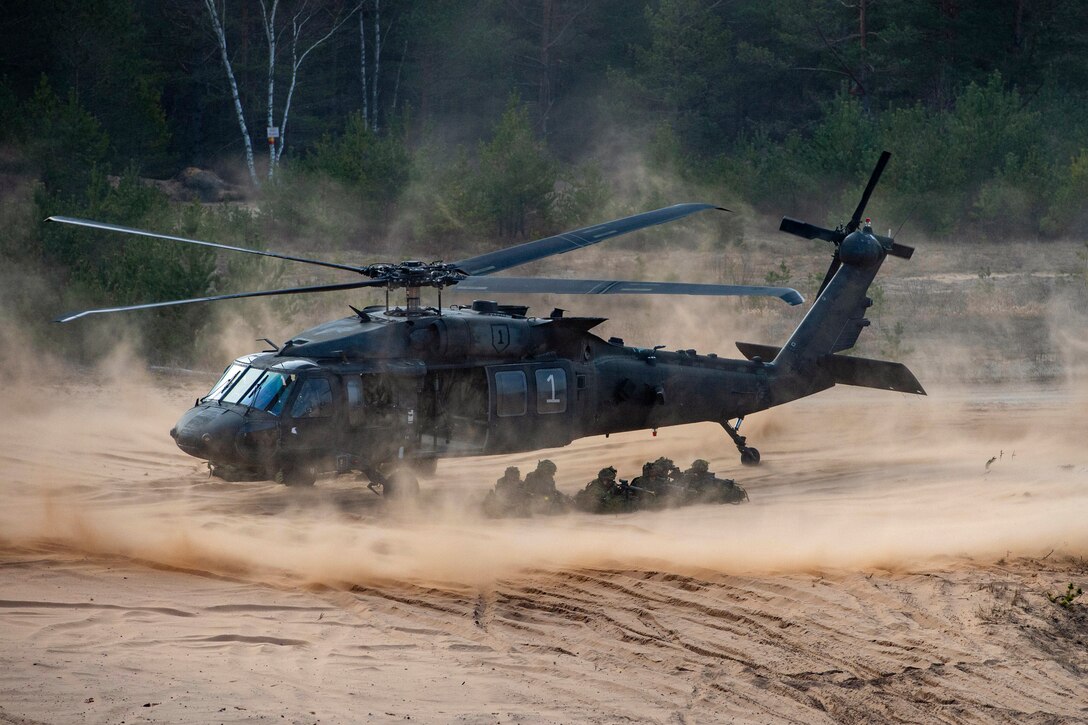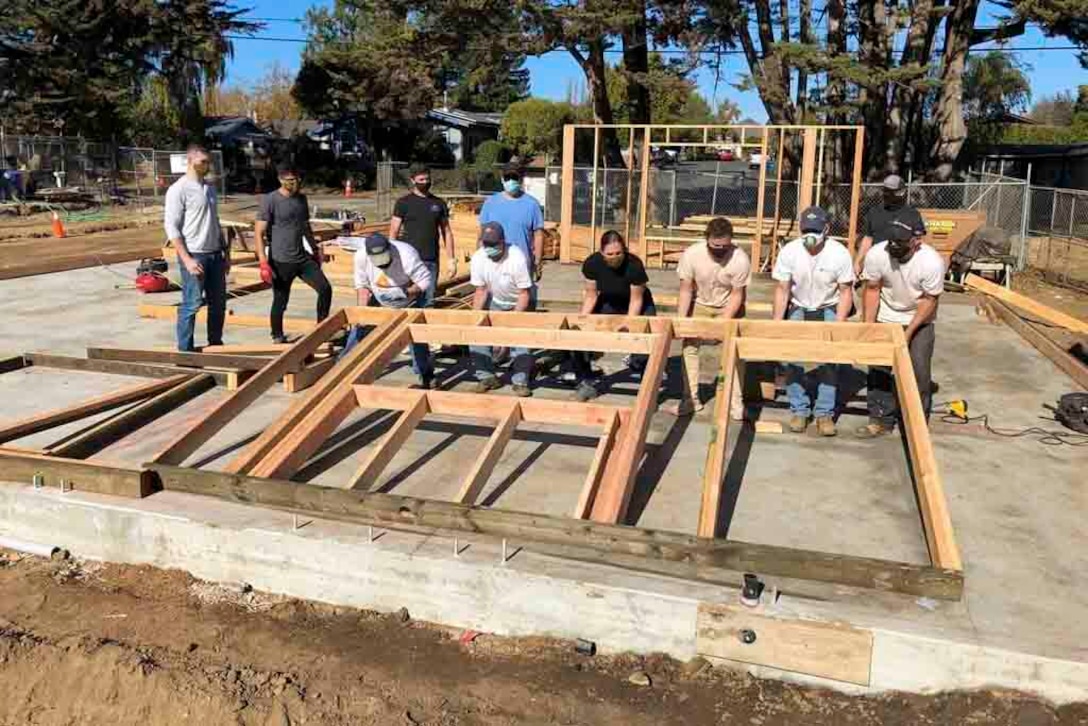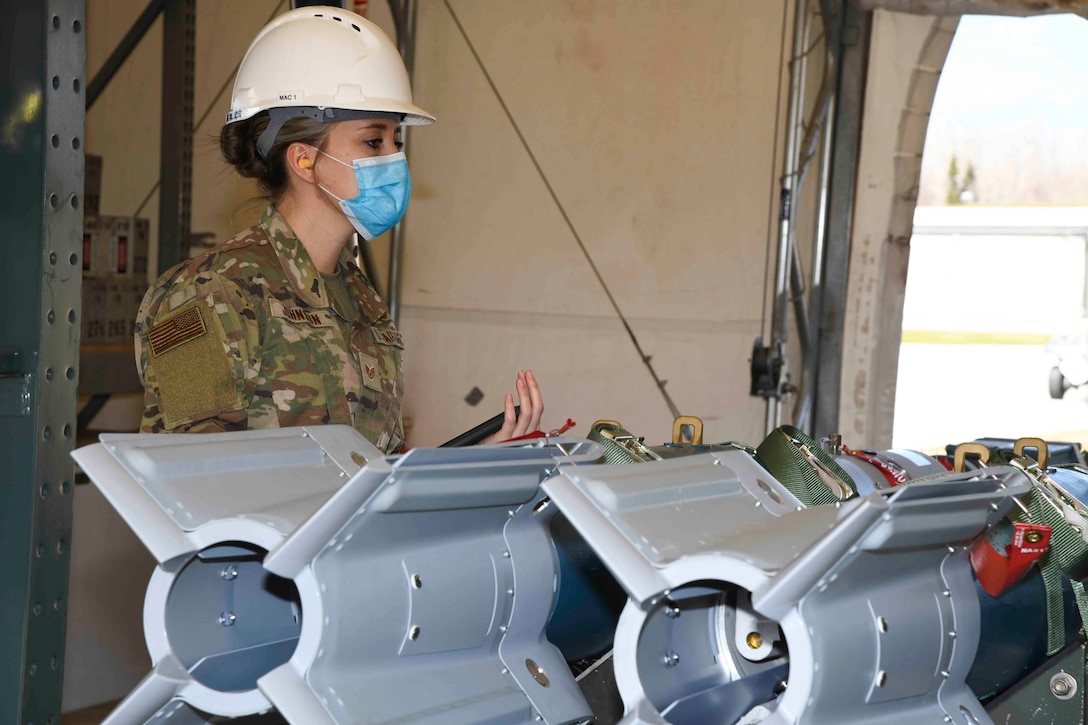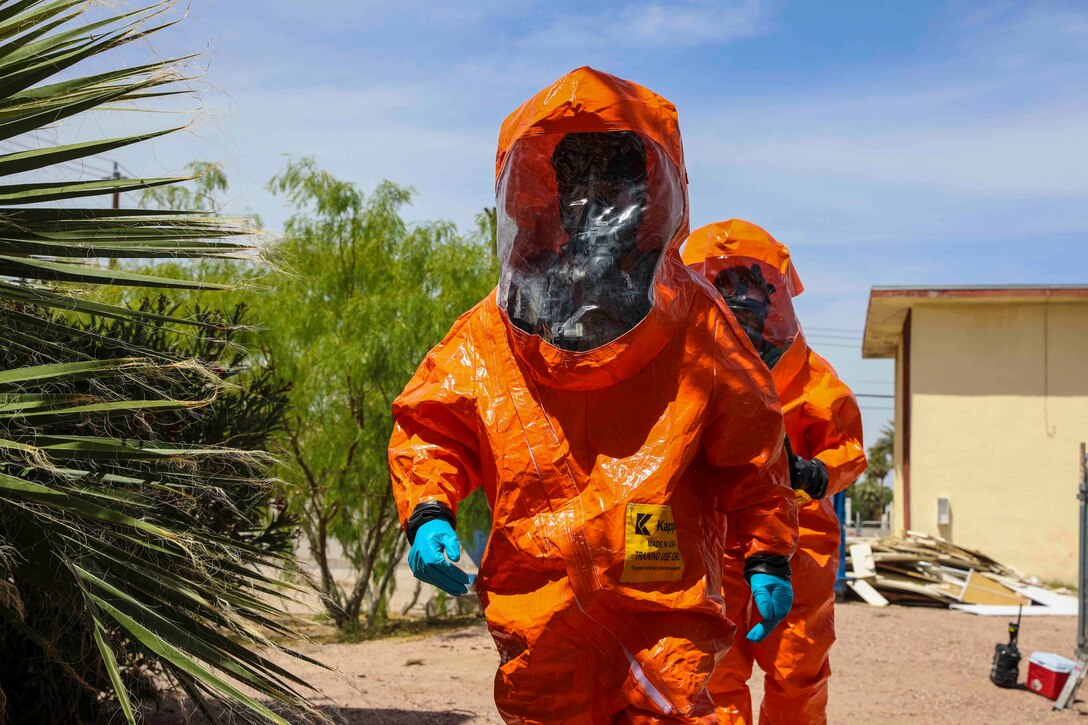Admiral Charles A. Richard (USN), commander, U.S. Strategic Command
STAFF: Good morning, ladies and gentlemen. Thanks
for being here. I want to go ahead and welcome you to today's morning
-- morning press conference and introduce to you the commander of the
U.S. Strategic Command, Admiral Chas Richard.
And sir, we'll just turn this right over to you.
We'll do Q&A after his opening remarks.
ADMIRAL CHARLES A. RICHARD: Well, all right.
Good morning, everyone. And as Brook just said, I'm Admiral Chas
Richard, commander of U.S. Strategic Command; have the privilege of
leading 150,000 soldiers, sailors, airmen, Marines, Guardians and
civilians. I appreciate y'all taking some time, have a conversation,
answer a few questions.
I do understand that this afternoon General McKenzie from Central
Command will also be doing one of these, and perhaps it's -- y'all
probably see him, and -- and I don't think I'm going to get the
opportunity. If y'all could pass him a "Roll tide" on my behalf, right,
I'd appreciate that.
The -- I do want to report that STRATCOM remains ready to accomplish
all of our assigned missions. That has not been easy, given the COVID
environment and other things, but we're fully mission-capable.
So as you know, I just spent a couple of days, along with another
combatant commander testifying to the House and Senate about my
responsibilities, my command's responsibilities, how well we're doing
those. And I -- I feel very privileged to have had that opportunity.
The -- as you know, we're responsible for maintaining strategic
deterrence and in doing so, enabling the rest of the Joint Force to
accomplish their missions.
I testified in some detail to the threats that we currently face. I
want you to know that we're fully ready for that challenge, including
the challenge of deterring two peer competitors at the same time. And I
did want to start off by saying I applaud the secretary's leadership in
all areas, but in particular, in our efforts to do a series of reviews,
to include a strategic deterrence review, and the way we're approaching
that because I think it's important to remember that nuclear deterrence
is not separate from strategic deterrence, is not separate from
conventional deterrence or space or cyber. Those must be all looked at
together in order to accomplish a strategic deterrence mission, and so I
applaud where we're going and the way we are approaching that.
So with that, I'll stop, and I'm happy to take your questions.
STAFF: Thank you, sir.
First, we'll start with Bob Burns, AP
Q: Thank you, Admiral Richard.
I wanted to ask you about a couple comments you made yesterday during
your -- your testimony. When you were talking about the issues with the
Minuteman III, and the question about possibly life extending it. You
said that there's a long list of parts that are in very short supply,
and you give an example of lock switches that you said there's only two
at the moment. And then you went on to say, "I'm afraid there's a point
where they won't -- they won't be able to pull a rabbit out of the hat
and the system won't work." I'm wondering if you could elaborate on
what sounds to me like an unreliable aspect of the system.
ADM. RICHARD: Okay, so the -- the Minuteman III system is -- is
fully reliable today; right. The question is both in terms of the
future, in terms of the system performance, as well as its ability to
pace the threat. You know, in the end, I defer to the U.S. Air Force in
terms of their ability to do that. They have assured me they can do
that. But it is getting increasingly harder, and I do want to have an
understanding of just what it's taking to keep that weapon system up to
the standards that we expect of it.
Q: But you said the system -- you're afraid the system won't work on
any given day. It doesn't sound like -- that sounds like a definition
of unreliable to me.
ADM. RICHARD: Again, today it works fine. Air Force -- I'm
confident in their ability to get it to the points where GBSD [Ground
Based Strategic Deterrent] is expected to come in. But this is another
example of no more margin; right. So can you keep going with that? I
want us to recognize that you can't indefinitely life-extend anything.
That's the point, right? You can't take stuff that you got back at the
end of the Cold War and to think somehow forever you can continue to
make it work, right? There's a point where it becomes not
cost-effective to do that, and there's another point out there, where
it's not possible at all. And I want to make sure that as we think
through these decisions, we recognize that those points exist and look
for them. I wanted to give a specific example of the detail that is
necessary to make sure we know where those points are.
STAFF: Very good.
Okay. I'll still go here in the room. We'll to go Meghann Myers.
Q: So, the other day in front of Congress you testified that you are
confident that there is zero extremists within Strategic Command, and
one of the reasons you offered that is because security clearances are
required for the entire organization. Do you want to clarify or expand
upon those comments?
ADM. RICHARD: I do, actually. I welcome the opportunity to do that.
Look, the standard is really clear: We don't tolerate extremism. My
forces live up to an even higher standard based on their
responsibility. This is not new; right. The Department of Defense has
never tolerated extremism. I think the secretary's leadership is on
point for us to remember, this is a continuing effort, right? The
stand-down, which my command has completed, was a great opportunity to
remind ourselves what is the standard, and to make sure that we're
upholding that standard.
So we're not done. And I'm not naive, and I don't think I'm immune
to this. So this is just the -- the -- a step in a longer process;
right. We are making sure that those procedures, security clearance
being one of them, are being rigorously executed, rigorous execution of
the Personnel Reliability Program. And I'll go back to what I said --
also said, which is if you're there, then you're hiding it very well,
and it is just a matter of time before I get to you. You are either on
Team Constitution or you are not, and if you are not, you have no place
in my forces.
Q: So just to clarify, you're confident that it's zero, but that's not based on any data or surveying or --
ADM. RICHARD: I know of none, right, and I'm looking really hard.
So that was one of the outcomes of the stand down, right, is we didn't
find anything. So yes, I know of none and I'm doing my best to make sure
that I haven't missed anybody.
STAFF: Okay.
Let's go to the phone. We're going to go to Sangmin Lee, Radio Free Asia.
Q: Yes, I have two questions.
It is known that deterrence and escalation came in the exercise had
it been made last week. So can you tell me, North Korea nuclear threat
is also included as a target to deter for this exercise?
And second question is, North Korea continues to develop and deploy a
more capable ICBM [Intercontinental Ballistic Missile] and sea-based
launch ballistic missile, so how do assess North Korea this capability?
And do you think that currently your strategic capability is capable to
deter North Korea nuclear threat?
ADM. RICHARD: Missed the -- the second half of the first question. I
think you were referring to what we call the DEGRE [Deterrence and
Escalation Game and Review] war game that was recently conducted. But
what was your question about that?
Q: So what is for this exercise? The North Korean nuclear threat is targeted for this exercise?
ADM. RICHARD: So the actual work specifics inside of DEGRE are
classified. And so I -- I'm not -- not really able to answer that
question. I will tell you that I am very confident in my ability to
deter -- we're very familiar with North Korea's capabilities and I'm
very confident in our ability to deter that.
STAFF: Okay.
And back in the room, Jenny?
Q: Thank you.
I ask about North Korea again. As you know that North Korea
continues to develop in nuclear weapon and WMD, weapons of mass
destruction, and recently North Korea has joined forces with China and
Russia.
It's, kind of, very dangerous to Korean Peninsula (inaudible). And
what are the strategic goals of the United States to protect the
alliance -- you know, from North Korea's for anything, you know,
biological weapons -- you know, weapons.
ADM. RICHARD: And so -- so the short answer is, first, I think that
situation is ripe for a diplomatic resolution. That that is the best
path to resolve issues with North Korea is using diplomacy first;
right. I will say that the United States -- and certainly my command --
are fully ready to honor our security commitments and alliance promises
that we have made to South Korea.
Q: And you are Strategic Commander, so do you have any -- you know,
best (inaudible) in strategic goals for the -- this North Korean --
ADM. RICHARD: Look, my goal is to fundamentally uphold my piece of
the responsibility in the assurances and commitments that we have made
to South Korea. And I'm fully ready to do that.
STAFF: Okay.
And now to -- let's go to here in the room. Mike Glenn?
Q: Yes, sir, can you tell me how well do you think Congress
appreciated your concerns during your testimony? Are you -- are you
optimistic about it or pessimistic, I mean, after spending the last
couple of days up there on the Hill?
ADM. RICHARD: Look, to be honest, I think you would have to ask them
how well I did. What I appreciate was the fact that I had the
opportunity to do it and to lay out the mission, both in an open and
closed hearing, the way I see it in a very frank manner. I think I
upheld my obligations to Congress to do that.
STAFF: Very good.
Also here in the room, Barb?
Q: Admiral, to follow up on some of Bob's questions, can you --
starting with the Minuteman III. Can you put some framework around it?
Are we talking months, years before it becomes unreliable and unable to
sustain? Is there any kind of framework on that?
ADM. RICHARD: Well, the framework is the Air Force has made a
commitment that they will be able to present me a Minuteman III
operating system to the IOC [Initial Operational Capability] and FOC
[Full Operational Capability] dates on GBSD, and I am fully confident
that they are able to go do that.
What I'm trying to point is that if you want to push that further,
right, you are going into uncharted territory. We may be able to chart
that territory, but there is an enormous amount of detail that has to go
into that, and the only organization that I know who is capable of
working through all of that detail is the United States Air Force.
That's my point. I'm trying to point out it is not simply a matter
of saying, "Well, the rocket'll work," and a couple of other things.
It's -- it's a weapon system --
Q: What year is that in your mind?
ADM. RICHARD: The IOC of GBSD is 2029.
Q: And Senator Warren yesterday, obviously, expressed a lot of
concern that, while you were giving your best military advice, she
raised the prospect that you were ahead of the reviews that are being
done about strategic policies, strategic reviews, nuclear reviews. Do
you worry that this candid advice you're giving is boxing in the
president before their reviews are done or even the budget is done?
ADM. RICHARD: Barbara, I tell you, I tried very -- I felt like
yesterday putting a sign beside my name that said "This is best military
advice."
I am a military officer, a military commander. I will do exactly
what the president tells me to do or not do. The advice I was giving
was not new; right. I have said that many times in the past, and in
fact, you could probably trace the lineage back to other Strategic
Command commanders.
So, I absolutely understand my place inside the chain of command.
And so, I'm absolutely ready to do whatever the nation asks me to do.
STAFF: Okay, let's go to the phones. We're going to go to Brian Everstine from the Air Force Magazine.
Q: Admiral, thank you for taking the time.
I was hoping to go back to your statement from a couple days ago on
the -- if somehow the ICBM leg of the triad is cut, you recommend
returning bombers to alert.
If -- looking at the current state of the Air Force's bomber fleet
and the bomber roadmap, is this something that could be hostile beyond
just a few days it has been exercised? And would that in turn cause the
recommendation to increase the B-21 buy?
ADM. RICHARD: Hey, so, one, thank you for the question.
And two, I was using that as specific example of the challenges the nation would fact, right?
Remember, I -- I am unique among the combatant commands that I don't
get to decide or offer to the secretary what my objectives are; right.
Most other combatant commands execute their missions that way. Mine are
directed by the president as interpreted by the secretary of defense
and the chairman of the Joint Chiefs of Staff. And so, I take those and
then look at the threat and then ask for the forces to accomplish it.
It's a very analytic process. And that results in -- and the nation
has repeatedly validated that given -- and those objectives that I'm
talking about are very consistent. I can trace their lineage back to
the Kennedy administration. And we've repeatedly decided the triad is
the best way to do that.
Doesn't mean that that's the decision that we'll come to in the
future, right? That's what these reviews are going to go show, and
we'll be ready to execute whatever decisions that the nation makes.
My point was given what I'm responsible for now, given the standards
that we have historically held this mission set to, which is
specifically, if any piece of it fails, right -- we assume we can fail
an entire people – for whatever reason, we can still do what we were
assigned to do with what remains. That -- I gave you the day-to-day
example of what I would ask for. That's only a subset. I'd still have
to figure out some other pieces.
And so that was only one subset of a larger class of stuff that I'd be responsible for figuring out an answer to.
STAFF: Okay, and also on the phone, we'll go to Frank Wolfe with Defense Daily.
Q: Yeah, good morning, Admiral.
I just had a question. I wondered if I could get your insights on
the 2018 Nuclear Posture Review, which stated that the SSBN force,
presumably, the existing Ohio-class SSBNs and the future Columbia class
will -- are virtually undetectable, and there's no near-term threat to
their survivability. So when we talk about the ground-based leg of the
triad being necessary, could you just explain that? If -- if, in fact,
you modernize the NC3 [Nuclear Command, Control and Communications]
command and control system so that the command authority could still get
in touch with the SSBNs, what -- what -- why is the triad -- why is the
ground leg necessary? Why is -- why is GBSD data or -- or the service
life extension of the Minuteman III necessary?
ADM. RICHARD: Hey, so first, there is a total amount of capability
and capacity that's required to execute the responsibilities that I have
been given. I need the -- the forces that we have, to include the
intercontinental ballistic missiles, to be able to accomplish all of
that. We don't have capacity in any to -- to start to change that
unless we change the guidance, right? And we can always do that.
Then the second piece is there -- there are things that we all take
as givens nowadays. One of them is bolt out of blue, right? I'm
referring to an unwarned large attack, right? I think we would all
agree that that is highly unlikely. We'd be the first to tell you that
it's highly unlikely because we look at it every day.
But we forget how we got here, in some cases. We made bolt out of
the blue unlikely. Ballistic missile submarines, the -- the
responsiveness of the intercontinental leg, our postures, our policies,
the way we execute. The reason bolt out of the blue is unlikely is
because it's probably not going to work; right. And so we have to be
careful when we make future decisions that we don't forget how we got
here, lest we return ourselves to a world we don't want to be in.
STAFF: And do we have any other questions here in the room? Kris Anderson?
Q: Thank you for taking my question.
I'm wondering if -- if you could talk a little bit about the
capabilities that Space Command has brought, having the Guardians under
your command.
ADM. RICHARD: One, I -- I applaud the decision to establish Space
Command. I think it has been a -- a great benefit to my mission sets.
As you know, we still think of ourselves as the proud parents of Space
Command because the responsibilities were transferred out of STRATCOM to
Space Command. And the -- of many things that I could point to in
terms of how General Dickinson helps me accomplish my mission better,
the one I'd point to is his role and responsibility as the sensor
manager. So now, we are looking across three different mission sets.
I'm specifically referring to them: missile warning missile defense and
space situational awareness, and we are able to take the nation's total
collection of capability and sensors, in this case, and use them much
more effectively such that all three missions actually benefited from
that. This is a good specific example of some of the ways we need to
think about command and control moving into the future.
STAFF: Very good. And one final?
Q: Yeah. Do you have any information about the North Korea --
prepared for the SLBM [Submarine-Launched Ballistic Missile] launch or
ICBM pretty soon?
ADM. RICHARD: So ma'am, look, we are ready for just about anything
North Korea can do. So I am fully confident that we're prepared for
whatever they might decide to do. All right.
Q: Thank you.
STAFF: Very good, very good.
Okay, and with that -- oh, actually, one final question from Lucas.
Q: Admiral, Lucas Tomlinson, Fox News.
Can you talk about the growing Chinese ballistic missile threat? And why is China putting ICBMs into the ground?
ADM. RICHARD: So one, as I testified, they have hit some kind of
inflection point. They're rapidly expanding. I think I covered that in
some detail in testimony, right? As to why they are doing that,
remember, they're very opaque. In -- in fact, Lucas, I -- I'd almost
ask you to ask them. And I was just -- I was getting ready for this. I
was, like, trying to think of other countries' admirals and generals
who are willing to get up in front of their press or are willing to go
testify in front of their congress or other legislative body, and -- and
I think it's something as Americans we should be proud of, that -- that
your military is willing to come and answer your questions. And I
can't ask them that question, right? But you can. And I would love for
some of these questions y'all asked me, if you would ask them the same
things. I -- I would like to know the answer myself.
Q: And then, talk about their growing stockpile.
ADM. RICHARD: Look, again, I covered that in a lot of detail, and --
and I would offer just one point, maybe, to -- to reemphasize.
Measuring a stockpile is -- is a very crude way to describe what a
nation can and can't do. There's much more to it. It's delivery
systems, command-and-control, readiness training. And I don't have the
luxury of deterring one country at a time, right? I have to deter all
countries, all the time, in order to accomplish my mission sets.
And so I'd ask just to -- to consider that, right, as we think through the security challenges that we have.
STAFF: Okay, sir, thank you very much.
ADM. RICHARD: All right.
STAFF: Do you have any final comments?
ADM. RICHARD: No. It's just a -- a privilege to -- to talk to y'all, and again, remember: McKenzie, "Roll tide," right?
(Laughter.)
Thanks.
STAFF: Thank y'all very much.
